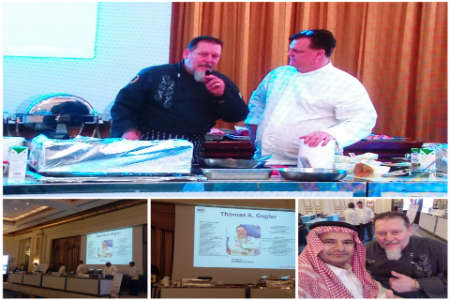- Delicious, high quality, halal, and 100% vegetable protein fed U.S. beef is now available in Saudi Arabia. U.S. beef is exported to 110 countries, and we are proud that it is back in Saudi Arabia. It is produced on about 900,000 ranches across the United States, 97% of which are family-owned. Most are fairly small, and many have been owned by the same family for several generations.
- The average cow grazes on a land area equal to several football pitches for twelve months and nurses from its mother for six months. All U.S. beef shipped to Saudi Arabia is certified by halal certification agencies and comes from a small number of facilities approved to produce beef for Saudi Arabia.
- Supplies of U.S. beef in Saudi Arabia are currently limited, but the number of restaurants and retailers carrying U.S. beef will grow over the next few months. American ranchers consistently produce a high quality product, and restaurants around the world rely on this quality to improve the experience of their customers.
- The Saudi Food and Drug Authority (SFDA) imposed a temporary ban on imports of U.S. beef and beef products on May 9, 2012 following a discovery of an atypical and spontaneous case of Bovine spongiform encephalopathy (BSE) in California. BSE cases in the United States are rare, and feed is regulated by the U.S. Department of Agriculture (USDA). The ban was lifted on June 28, 2016, following negotiations that ended in December 2015. SFDA regulations for livestock and poultry meat products require that the animals slaughtered have not been fed animal protein. In order for USDA to issue the required animal protein free certification, U.S. exports of beef to the Kingdom must come from slaughter facilities that participate in a complex Bovine Export Verification Program.
- All food produced in the United States can be, and most often is, sold and consumed in the United States. We have developed strong and independent regulators that insure the safety and quality of U.S. foods for our own citizens and the millions of people that enjoy U.S. food around the world. Those regulators are present in every establishment that handles exported meat.

